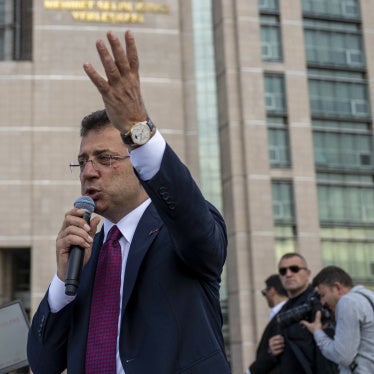A proposed 'economic reconciliation' law will provide impunity for corruption and economic crimes, threatening the transitional justice process and deflecting the message at the heart of the Tunisian revolution.
As Tunisia grapples with a security and economic crisis that threatens to derail its democratic transition, it faces a serious new challenge: a presidential initiative to grant amnesty to former regime figures, state agents and business executives accused of corruption and other economic crimes. If implemented, the proposal would set back accountability and transitional justice.
Tunisia’s government agreed the draft law on “Reconciliation in the economic and financial sectors” on July 14 and forwarded it to parliament, which has yet to set a timetable for its adoption.
President Beji Caid Essebsi took the lead in promoting the proposed law, using his Independence Day speech on March 20 to claim that it will “pacify the environment for investment” and enhance the recovery of assets from corrupt business executives, allowing them to be used for development projects. As currently worded, however, the proposed law would confer a broad amnesty on public officials and businessmen responsible for financial corruption or embezzlement, and undermine the transitional justice process painstakingly initiated in 2013. That process, considered vital to addressing the crimes and corruption seen under the former Ben Ali administration, rests on effective truth-seeking, accountability and reparations.
In 2013, the National Constituent Assembly adopted a law that sets out a comprehensive approach to addressing past human rights abuses. It provided for criminal accountability by establishing specialised trial chambers to judge cases arising from serious human rights violations and created a Truth and Dignity Commission (TDC), mandated to uncover the truth about human rights abuses committed between July 1955, shortly before Tunisia gained independence from France, and 2013. The law establishes mechanisms for reparations to victims, including those who suffered from abuses such as forced eviction and land expropriation, institutional reform and vetting of civil servants. One of the commission’s functions is to mediate between parties on economic and financial abuses committed prior to 2013.
Since its inception, the TDC has faced criticism and strong opposition from political parties whose leaders include politicians and business executives who held prominent positions during the administration ousted by popular protests in 2011. Essebsi was minister of interior in the 1960s and faced calls for accountability for state repression against student and leftist movements. He has portrayed the transitional justice process as a tool to settle political scores and called for Tunisians to “look to the future and turn the page on the past”. He clearly proposed the new law in that spirit.
The enactment of the law would cause the suspension of all prosecutions, trials or sentences against public servants and other agents for acts linked to financial corruption or embezzlement, as well as business executives who made a reconciliation request to a state-controlled commission.
The proposed law would also prevent any further investigations into serious corruption under Ben Ali by prohibiting use of “the information obtained in the framework of this law for another purpose or in another setting.” This would undermine the TDC’s mandate to establish the truth about human rights abuses under the former regime and efforts to map the extent of the economic crimes.
In one sense this is nothing new, as the TDC has been hostage to political maneuvering and media attacks since its inception. The proposed law would further undermine and isolate the TDC and threaten the entire transitional justice process.
In Tunisia, as elsewhere, corruption and human rights abuses have proved mutually reinforcing, with a direct correlation between graft and violations of economic and social rights. Under the Ben Ali administration, economic and natural resources were diverted to benefit a small minority of corrupt cronies and business executives, harming most people’s social and economic rights by weakening Tunisia’s capacity to invest in education, health care, and housing.
The massive corruption obstructed the development of a dynamic economy, preventing fair competition and job creation, while also fueling civil and political rights abuses. Under Ben Ali, those who benefited from corruption controlled state institutions and used intimidation, torture and other abuses to protect their position.
Four years after Ben Ali’s ouster, the full extent of corruption and plunder is yet to be uncovered. According to a 2014 World Bank study , between 1987 and 2011, Ben Ali and his relatives embezzled assets worth approximately $13 billion, equivalent to more than 25 percent of Tunisia’s GDP in 2011. The same study also showed that businesses “confiscated to Ben Ali’s extended family account for 3.2 percent of all private sector output, and a striking 21.3 percent of all net private sector profits in Tunisia.” The World Bank study recognized that corruption remained endemic after Ben Ali’s flight, noting that “the prevalence of corruption to ‘speed things up’ in Tunisia is among the highest in the world.”
The authorities who took power in 2011 appointed a commission to investigate corruption and embezzlement, and it examined 5,000 complaints. It released its report in November 2012, exposing a vast system of structured corruption through which Ben Ali’s family and cronies had diverted public funds and lands for their benefit. The report concluded that state institutions such as public banks, the judiciary, and the police, had all been transformed into instruments of coercion so that those who refused to submit to the demands of the presidential family and cronies faced physical and judicial intimidation and harassment.
The commission sent evidence on 400 cases to the courts. But according to Samir Annabi, head of the national anti-corruption commission, most cases were either dismissed for procedural issues, received very light sentences or are still at the instruction phase.
The transitional government decided to confiscate or freeze the assets of 114 members of Ben Ali’s extended family and 120 business executives who had amassed vast wealth thanks to their ties to Ben Ali. If the proposed law is enacted, it will reverse these measures and halt judicial proceedings.
International practice on transitional justice is moving towards an approach that includes economic and social rights abuses. Although still rare, several initiatives in transitional justice have incorporated corruption and financial crimes.
The Tunisian example offers an interesting look into this new approach. During the drafting of the transitional justice law, civil society groups and lawmakers chose to include corruption and economic crimes as pillars of the process. They recognised that economic crimes were hallmarks of the Ben Ali administration and played a central part in establishing and maintaining his authoritarian system through 23 years in power.
The law thus granted the TDC a mandate to mediate cases relating to corruption and economic crimes. Any perpetrator who requests mediation is required to acknowledge his guilt and offer a clear apology. Mediation cases can result in the suspension either of litigation or of the execution of the sentence of a judicial authority. The statements given by the perpetrator and evidence collected by the TDC can serve to reveal the institutions and networks of individuals that allowed corruption to proliferate. This information can then be integrated in the final report of the TDC, an important part of truth telling in the transitional justice process that will constitute the national narrative about past abuses.
To compare the transitional justice law and the proposed economic reconciliation law: both include amnesty for economic crimes and envisage the suspension of judicial and legal proceedings in exchange for reparation and asset recovery. But the former is more transparent, rests on public acknowledgment and apology for the crimes, and involves an independent mechanism. The proposed economic reconciliation law is not built around the idea of truth-telling: all the information obtained will be kept secret, preventing any future learning, teaching or institutional reform based on the findings. The bill gives the state-run commission very little time to investigate the facts, thus allowing the corrupt to hide the extent of the money stolen.
The proposed law would also prevent future vetting of the public administration, allowing officials, former officials and others who aided, abetted or helped the system of abuse to benefit from a general amnesty without having to tell the truth about what happened or apologize. Such a blanket amnesty will likely entrench abusive conduct by state agents.
Just as impunity for human rights violations fuels more abuses by giving perpetrators the sense that their actions are approved, so impunity for economic crimes is likely to give corrupt state agents the confidence to continue acting corruptly.
Tunisia has a legitimate process for dealing with the crimes of the past, including financial crimes and corruption. Replacing it with a new mechanism that will provide impunity and preclude any vetting or accountability for state agents or businessman is a dangerous path. The proposed new system sends a clear signal that serious corruption will be tolerated and that kleptocrats can expect to be gently treated. That was not the message at the heart of the Tunisian revolution, which started with the desperate gesture of a man facing economic and social injustice.








